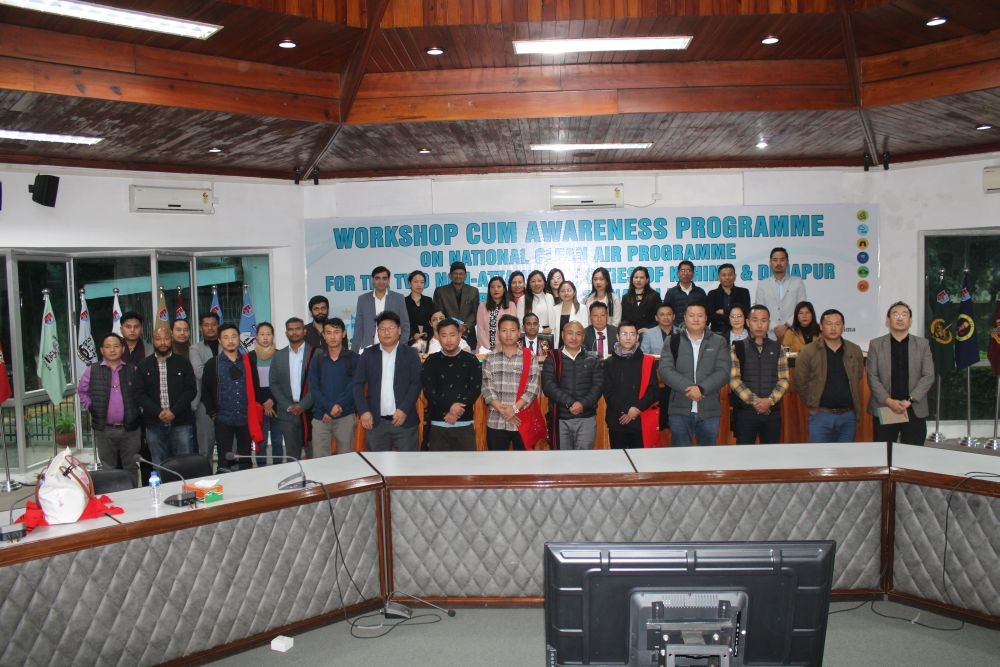Participants during the workshop cum awareness programme on National Clean Air Programme for the two non-attainment cities of Kohima and Dimapur at Chümoukedima.

Dimapur, January 25 (MExN): Nagaland Pollution Control Board (NPCB) organised a workshop cum awareness programme on National Clean Air Programme (NCAP) for the two non-attainment cities of Kohima and Dimapur at Rhododendron Hall, Police Complex, Chümoukedima.
The programme was graced by N Subrahmanyan, Jt Director, Ministry of Environment, Forest and Climate Change (MoEFCC), Sakshi Batra, Scientist ‘B’, Central Pollution Control Board (CPCB) along with Y Atsase Thongtsar, Secretary, EF&CC, Kohima and Kevithuto Sophie, IPS, Commissioner of Police, tte board stated in a press release.
The other participants were representatives from the stakeholder departments under NCAP- Urban Development & Municipal Affairs, Kohima Municipal Council, Dimapur Municipal Council, Department of Industries & Commerce, Forest Department of Kohima and Dimapur, District Transport office, NIT Chümoukedima, participants from the Assam and Meghalaya Pollution Control Board and NE Regional Office of CPCB, Meghalaya.
The main objective of the programme was to sensitise the stakeholder departments under NCAP on the objectives and aims of the programme and to build the capacity of the concerned departments through demonstrative presentations on the various activities that are to be undertaken, the release stated.
K Hukato Chishi (IFS), Member Secretary, NPCB chairing the programme stated that “the aim for clean air in our cities is a public necessity and encouraged collaborative efforts to address the issue in the state.”
In his keynote address, Rusovil John, Chairman, NPCB, encouraged the cooperation of all the stakeholders to address the issues of air pollution along with the board.
He gave a brief overview of NCAP targets and goals of reducing the concentration of particulate matter up to 40% by 2026 using 2017 as the base year for comparison and stated the status of the concentrations in both the non-attainment cities of Nagaland.
N Subrahmanyan gave a detailed presentation on the overview of NCAP in India with special reference to Nagaland. He highlighted the strategies and state’s role in implementation of NCAP emphasising on the importance of converge of resources at the national, state and city level, preparation of state, city and micro plans to leverage funds and updation of annual plans on the PRANA portal by the concerned Urban Local Bodies (ULBs) to ensure smooth functioning and implementation of NCAP in the state.
PRANA- Portal for Regulation of Air-pollution in Non-Attainment cities is a portal for monitoring of implementation of NCAP which is to be accessed by the state pollution boards and ULBs for data input of annual, city and micro action plans and various other activities and financial information. It will be made accessible in the public domain for information dissemination, and provide a platform to give overview of the programme and the city dashboards.
Yanathung Kithan, Scientist B of NPCB gave an overview of the status of NCAP in the state and the various activities undertaken through the stakeholders like PWD, Forest Department, DTO, ULBs which included awareness campaigns, procurement of road sweeping machines, construction of roads and vertical gardens, setting up of public grievances portal among other activities.
Currently, the board has four and seven air monitoring stations in Kohima and Dimapur respectively under the National Air Monitoring Programme (NAMP).
In his presentation, he gave a graphical representation of the status of concentrations in the cities of Kohima and Dimapur, where it was seen that the concentration levels in Kohima has reduced to a great extent owing to better roads in the city. However, it was the concern of the board that the concentration levels have only increased more than 50% in the year 2021-22 in Dimapur.
Sakshi Batra in the technical session put forward the question of ‘Who wants clean air for themselves?’ and stated that the NE non-attainment cities have failed to meet the requirements of bringing down the ambient air quality levels below the permissible limit (60ug/m³) for the past few years.
However, the percentage of increase in the level of concentration in the NE states is comparatively much lower than the other states in India with special reference to the states in the north, Batra stated.
In her presentations, she explained about the clean air city action plans and its micro planning - needs, objectives, development, implementation and outcomes through the activities under NCAP.
She requested the stakeholders and scientific knowledge partners to make collaborative efforts in implementation of the activities under NCAP and to focus on pro-active and contextual approaches especially by the ULBs.
Certain gaps in the functions of the state were also identified of which she also mentioned the irregular meetings of the implementation committee under NCAP for the state of Nagaland and urged the nodal officers to conduct the meetings regularly in order to ensure more efficient and adequate planning of activities under the programme.





